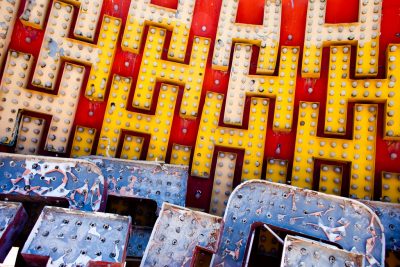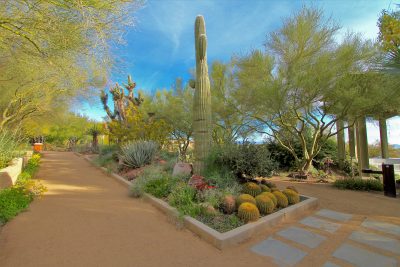Plugging into “Power Lines”: New ideas and tips for panel proposals
06 June 2017 – Priya Chhaya

H is for History. A look at the Neon Museum in Las Vegas. Photo credit: Thomas Hawk via Flickr Creative Commons
When we agreed to chair the program committee for the 2018 NCPH annual meeting, we were determined to develop a conference that reflected the richness of the field but also addressed, with a sense of urgency, pressing questions about the profession’s relationship to the public. These goals are reflected in our theme statement and in some concrete changes we are making to the conference proposal form.
The phrase “power lines” is designed to invite reassessment of public history’s ideals in a time when the very notion of “public” is increasingly viewed with suspicion by both right and left. What is the line between tight knit community and insularity? Between a strong sense of identity and exclusion? Between de-centering the expert and fake news?
“Power lines” invites proposals that explore these questions at several levels. Most directly, the phrase speaks to the power of drawing connections—between past and present, within communities, or across difference. On a second level, the theme raises questions about borders and boundaries—how they coalesce and divide, bringing together those within the lines and separating those beyond them. Finally, the phrase addresses the struggle to establish effective lines of communication—to convey our ideals and ambitions to wider publics, to truly hear the concerns and viewpoints of our constituencies, and to open up accessible routes for new ideas, perspectives, and conversations to build a truly inclusive field.
These concerns—about relevance, boundaries, and communication—underlie the core questions articulated in the theme statement:
- Can public history help envision a civic whole?
- What is public history’s role in building community?
- How can public historians be effective advocates, facilitators, and spokespeople for the power of the past?
These questions also shaped the changes that we made to the proposal process as well as how the full committee will review submissions at the end of the summer.
Addressing Inclusion
This year we want to push proposals to be intentionally inclusive. In the most important sense, this means working to include underrepresented voices wherever appropriate—on the session, in the stories you are telling, and in the dialogue you envision. Inclusion is not just about ethnic and racial diversity: it is about having and encouraging difficult conversations. The strongest panels will include individuals with varying viewpoints, with presenters from different institutions and backgrounds (we discourage panels with participants all from the same institution).
You will see these expectations reflected in the proposal submission form where we ask submissions to include, if appropriate to their panel, a statement about how their session advances inclusion:
The 2018 Program Committee seeks to prioritize proposals that highlight traditionally underrepresented voices in the field and engage critically with public history in an inclusive way. If your proposed session or working group contributes to this effort (whether in content or in the personal backgrounds or work experiences of the listed presenters), please describe briefly below.

View from the Las Vegas Springs Preserve. Photo credit: Renee via Flickr Creative Commons
Inviting Public Voices
In considering public history’s power dynamics, we think it essential to encourage presenters to consider not only the goals and execution of projects but how they were received and shaped by the communities they served. We are encouraging public participation in the conversations in Las Vegas in a number of ways. The first is by adding a new session format:
Community Viewpoints: A project showcase that features participants from the communities that the project served.
First-person reflections can be a way to bring new voices to the NCPH. If it is not possible for community partners to attend in person, panels can use pre-recorded audio or video to share their viewpoints. While exit data and survey information are important, we want to encourage creative ways of showing impacts and advancing dialogue.
Articulating Learning Goals
To encourage an audience-centered approach to designing proposals, we want presenters to consider in advance the potential outcomes of their sessions. While it is important and beneficial for presenters to disseminate their information, we want to make sure that the takeaways from the session are clear. So, the proposal form asks:
Please state one or two learning goals for your session. Potential questions to consider include: What new understandings or perspectives will your audience gain? What tools, ideas, or resources will they develop? What new practices might they be inspired to try?
We hope that these additions to the proposal process will encourage sessions that are both inclusive and challenging. We can’t wait to see what you send our way!
Complete session proposals are due July 15, 2017.
~ Priya Chhaya is the Manager for Online Content at the National Trust for Historic Preservation.
~ Benjamin Filene is the director of public history at the University of North Carolina-Greensboro.
They are the co-chairs of the 2018 Annual Meeting for NCPH.



